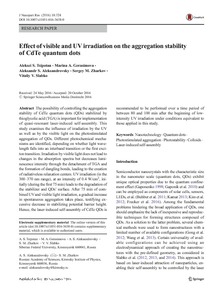Effect of visible and UV irradiation on the aggregation stability of CdTe quantum dots
URI (для ссылок/цитирований):
http://link.springer.com/article/10.1007/s11051-016-3638-0https://elib.sfu-kras.ru/handle/2311/69787
Автор:
Tsipotan, A. S.
Gerasimova, M. A.
Aleksandrovsky, A. S.
Zharkov, S. M.
Slabko, V. V.
Коллективный автор:
Институт инженерной физики и радиоэлектроники
Научно-исследовательская часть
Базовая кафедра фотоники и лазерных технологий
Кафедра общей физики
Институт нанотехнологий, спектроскопии и квантовой химии
Дата:
2016-11Журнал:
Journal of Nanoparticle ResearchКвартиль журнала в Scopus:
Q2Квартиль журнала в Web of Science:
Q2Библиографическое описание:
Tsipotan, A. S. Effect of visible and UV irradiation on the aggregation stability of CdTe quantum dots [Текст] / A. S. Tsipotan, M. A. Gerasimova, A. S. Aleksandrovsky, S. M. Zharkov, V. V. Slabko // Journal of Nanoparticle Research. — 2016. — Т. 18 (№ 11). — С. 324-8Текст статьи не публикуется в открытом доступе в соответствии с политикой журнала.
Аннотация:
The possibility of controlling the aggregation stability of CdTe quantum dots (QDs) stabilized by thioglycolic acid (TGA) is important for implementation of quasi-resonant laser-induced self-assembly. This study examines the influence of irradiation by the UV as well as by the visible light on the photostimulated aggregation of QDs. Different photochemical mechanisms
are identified, depending on whether light wavelength falls into an interband transition or the first exciton transition. Irradiation by visible light does not lead to changes in the absorption spectra but decreases luminescence intensity through the detachment of TGA and the formation of dangling bonds, leading to the creation of radiativeless relaxation centers. UVirradiation (in the 300–370 nm range), at an intensity of 0.4 W/cm2, initially (during the first 75 min) leads to the degradation of the stabilizer and QDs’ surface. After 75 min of combined UVand visible light irradiation, a gradual increase in spontaneous aggregation takes place, testifying excessive decrease in stabilizing potential barrier height. Hence, the laser-induced self-assembly of CdTe QDs is recommended to be performed over a time period of between 80 and 100 min after the beginning of lowintensity UV irradiation under conditions equivalent to those applied in this study.

